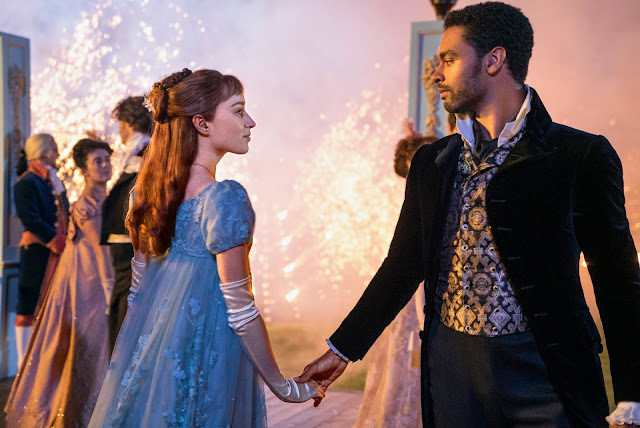
Rose Williams as Charlotte Heywood in Sanditon season 3, based on Jane Austen' s unfinished novel
In a world filled with modern technological marvels and fast-paced storytelling, it may seem surprising that costume dramas, period dramas, and historical dramas continue to captivate audiences. Shows like Bridgerton, Peaky Blinders, Downton Abbey, Outlander, The Gilded Age and adaptations of Jane Austen's novels transport viewers to bygone eras, providing a glimpse into the past. Yet, these productions are far from relics; they are thriving in the age of streaming services and digital entertainment. So, what is it about these narratives that continues to draw us in? Let's explore the enduring appeal of costume dramas and why they remain relevant and popular today.
Escapism to Another Time
 |
| Caitriona Balfe and Sam Heughan as Claire and Jamie Fraser in season 7 |
One of the primary reasons for the popularity of costume dramas is their ability to transport viewers to a different time and place. Whether it's the Regency-era London of Bridgerton, the gritty streets of post-World War I Birmingham in Peaky Blinders, or the 18th-century Scotland of Outlander, these shows offer a form of escapism that allows us to step away from our modern lives and immerse ourselves in the past. This escape is especially appealing in today's fast-paced world, where many seek solace in the nostalgia and romance of bygone eras.
- Rich Historical Settings

Much of The Gilded Age and, especially, ep. 9 in season 1, is centered around who—and who was not—invited to a party. - Costume dramas are often meticulously researched and crafted to recreate historical settings with remarkable detail. From the elaborate costumes and set designs to the historical accuracy of the dialogue and cultural norms, these shows provide a window into the past like no other. Viewers can learn about different time periods, social hierarchies, and the challenges people faced during those times, all while being entertained. This combination of historical accuracy and storytelling prowess appeals to those with a love for history as well as those who simply enjoy a well-crafted narrative.
At the heart of every great costume drama are the characters and their relationships. Whether it's the witty banter and budding romances of Bridgerton or the complex family dynamics of Peaky Blinders, these shows excel at creating characters that resonate with viewers. They struggle with universal themes like love, power, ambition, and morality, which are as relevant today as they were in the past. We become invested in their lives, rooting for their successes and lamenting their failures, much like we do with characters in contemporary stories.
- Timeless Themes and Social Commentary
 |
| Peaky Blinders- A gangster family epic set in 1900s England, centering on a gang who sew razor blades in the peaks of their caps |
In recent years, costume dramas have also adapted to address modern sensibilities. Shows like Netflix's Bridgerton have embraced diversity and inclusivity, featuring a racially diverse cast and addressing issues of race and class in a historical context. By doing so, they not only make the past more accessible to a wider audience but also highlight the relevance of historical narratives to contemporary conversations about representation and identity.
 |
| Dakota Johnson as Anne Elliot in Netflix Persuasion 2022 |
The enduring popularity of costume dramas, period dramas, and historical dramas like Bridgerton, Peaky Blinders, Outlander, and Jane Austen adaptations can be attributed to their unique ability to blend elements of history, romance, escapism, and social commentary. These shows transport us to different worlds while simultaneously addressing themes and issues that remain relevant today. In an ever-changing media landscape, costume dramas offer a comforting and enriching experience, reminding us that the past has much to teach us about the present and the future. So, it's no wonder that they continue to capture our hearts and minds, proving that some stories are truly timeless.


No comments:
Post a Comment